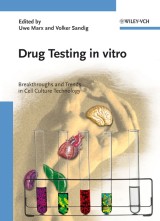Details

Drug Testing In Vitro
Breakthroughs and Trends in Cell Culture Technology1. Aufl.
|
124,99 € |
|
| Verlag: | Wiley-Blackwell (WB) |
| Format: | |
| Veröffentl.: | 27.02.2007 |
| ISBN/EAN: | 9783527609567 |
| Sprache: | englisch |
| Anzahl Seiten: | 318 |
DRM-geschütztes eBook, Sie benötigen z.B. Adobe Digital Editions und eine Adobe ID zum Lesen.
Beschreibungen
Here, expert scientists from industry and academia share their knowledge on the assembly of functional human tissues in vitro and how to design drug screenings predictive of human exposure. In so doing, they combine the latest technological developments with strategic outlooks, such as novel cell and tissue systems for drug screening and testing, as well as emerging in vitro culture technologies. Equally importantly, the book does not shy away from regulatory acceptance and ethical issues.
Foreword (Rolf Krebs)<br /> Preface<br /> List of Contributors<br /> PART I EMERGING IN-VITRO CULTURE TECHNOLOGIES<br /> Intelligent Biomatrices and Engineered Tissue Constructs: In-Vitro Models for Drug Discovery and Toxicity Testing (Philip Lazarovici, Mengyan Li, Anat Perets, Mark J. Mondrinos, Shimon Lecht, Christopher D. Koharski, Paul R. Bidez III, Christine M. Finck, and Peter I. Lelkes)<br /> An Overview on Bioreactor Design, Prototyping and Process Control for Reproducible Three-Dimensional Tissue Culture (Ralf Pörtner and Christoph Giese)<br /> An Overview on Bioelectronic and Biosensoric Microstructures Supporting High-Content Screening in Cell Cultures (Andrea A. Robitzki and Andrée Rothermel)<br /> Novel In-Vitro Exposure Techniques for Toxicity Testing and Biomonitoring of Airborne Contaminants (Amanda Hayes, Shahnaz Bakand, and Chris Winder)<br /> PART II PRIMARY TISSUES AND CELL LINES IN DRUG SCREENING/TESTING<br /> Drug Screening Using Cell Lines: Cell Supply, High-Throughput and High-Content Assays (Christa Burger, Oliver Pöschke, and Mirek R. Jurzak)<br /> Cell Lines and Primary Tissues for In-Vitro Evaluation of Vaccine Efficacy (Anthony Meager)<br /> Designer Cells Derived from Primary Tissue and Designed Cell Lines as a Sustainable Cell Source for Drug Discovery and Safety Assessment (Volker Sandig and Ingo Jordan)<br /> How Human Embryonic Stem Cell Research Can Impact In-Vitro Drug Screening Technologies of the Future (André Schrattenholz and Martina Klemm)<br /> PART III THE USE OF HUMAN TISSUES IN DRUG DISCOVERY: SCIENTIFIC, ETHICAL, LEGAL, AND REGULATORY ENVIRONMENTS<br /> Availability, Standardization and Safety of Human Cells and Tissues for Drug Screening and Testing (Glyn N. Stacey and Thomas Hartung)<br /> Ethical Environment and Scientific Rationale Towards In-Vitro Alternatives to Animal Testing: Where Are We Going? (Horst Spielmann)<br /> PART IV SUMMARY AND VISIONS<br /> How Drug Development of the 21st Century Could Benefit from Human Micro-Organoid In-Vitro Technologies (Uwe Marx)<br /> Subject Index<br />
"...highly topical handbood..."<br /> Anticancer Research<br />
Dr. Uwe Marx<br /> After finishing medical training Uwe Marx received his doctorate degree in immunology from the Humboldt University, Berlin. In 1995 Dr. Marx was appointed Head of the Department of Medical Biotechnology at Leipzig University and joined ProBioGen, Berlin, in 2000 as Chief Scientific Officer.<br /> With more than 20 years of experience in protein drug development and improvement of cell culture techniques, Uwe Marx has published more than 50 scientific papers and holds numerous patents.<br /> <br /> Dr. Volker Sandig<br /> Volker Sandig studied medicine and received his PhD in molecular biology from the Humboldt University, Berlin. He designed experimental strategies for adenovirus based tumor treatment and directed research projects in cell cycle regulation and artificial promoters at the Max Planck Society and Hepavec, a former Berlin-based biotech company. He then joined Merck Research Laboratories, USA and was appointed Vice President Molecular Biology and Virology at ProBioGen, Berlin, Germany in 2000.
Here, expert scientists from industry and academia describe an emerging platform technology with tremendous potential. Human micro-organoid in-vitro test systems could well be the next breakthrough in overcoming two major obstacles for developing new therapeutics. Firstly, they allow the identification of the biological effects of new drugs that involve systemic interactive networks specific to humans. Secondly, they facilitate the testing of human genetic diversity and genetic predisposition. In addition, there is increased industrial interest in these test systems to comply with such regulative measures as the cosmetics directive or the European REACH program for the registration, evaluation and authorization of chemicals. <p>This highly topical handbook is divided into four parts, the first providing an overview of emerging in-vitro culture technologies. Part II covers primary tissues and cell lines in drug screening/testing. Part III emphasizes conflicting ethical, regulatory and commercial requirements for drug testing and screening on human micro-organoids in vitro as a viable alternative to animal testing,. The final part concludes with the tremendous potential of the in-vitro drug evaluation platform technology, using human immune micro-organoids as a prime example.</p> <p>The book is introduced by a short foreword by Rolf Krebs, former president of the European Federation of Pharmaceutical Industries and Associations and of the International Federation of Pharmaceutical Manufacturers Associations, as well as a Member of the Board of Directors of the Chemical Industry Association.</p> <p>The result is essential reading for professionals dealing with drug development and testing, or chemical risk assessment.</p>
Diese Produkte könnten Sie auch interessieren:

Tropical and Parasitic Infections in the Intensive Care Unit

von: Charles Feldman, George A. Sarosi

149,79 €















